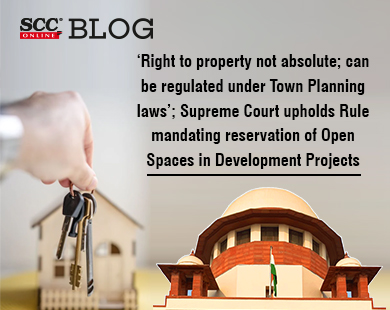Supreme Court: In case where the issue revolved around the mandatory earmarking of a portion of land by the developer as an Open Space Regulation area (OSR) in terms of Rule 19 of the Development Control Rules, the bench of KM Joseph* and PS Narasimha, JJ has upheld the said Rule and has observed that the areas covered by the OSR cannot be diverted for any other purpose and must be stringently utilised only for the purpose in the Rule/Regulation.
As per the Rule in question, if the layout of the development plan is between 3,000 sq. mtr. and 10,000 sq. mtr., 10% of the area excluding roads is to be maintained as open space. In cases falling in the the category of group developments which comprise of an area in excess of 3,000 sq. mtr. and up to 10,000 sq. mtr., it is open to the project proponent to pay the market value equal to the land on the basis of valuation as provided therein. However, it is only if on account of the physical constraints it is not possible to provide open space, that payment is contemplated. Further, where the land is between 3,000 sq. mtr. and 10,000 sq. mtr. public access for the area as earmarked shall not be insisted upon. It is when it comes to a case where if the area goes above 10,000 sq. mtrs., that it becomes obligatory to reserve 10% of the area excluding road and the OSR reserved is to be transferred by way of gift deed.
The Rule also provides that the land so reserved is to be freed from any construction by the owner/promoter/developer. The land for communal and recreational purposes, is to be restricted at ground level.
Rejecting the arguments that the Rule is discriminatory and ‘injuriously affects’ the developers, the Court held that,
“The case of a person developing land being subjected to the requirement of leaving 10 percent of the property in a situation where more than nearly 2 and a half acres is being developed in an urban metropolis as space for communal and recreational purposes cannot be said to be a person ‘injuriously affected’ within the meaning of Section 39.”
On the issue of right to hold and enjoy property, the Court held that an owner of land may not have an absolute and unqualified right which is the idea which not unnaturally comes to mind when the idea of ownership is under consideration. The right is capable of being regulated and restricted under a law relating to Town Planning. Proceeding on the basis that DCR is law, the question would arise under the said law whether a person can use his land as he chooses. Zoning requirements have been put in place.
“Primarily in a residential zone, can anyone put up an industrial establishment if the said use is prohibited? The answer is quite clearly in the negative. Can anyone construct a building in excess of the stipulated requirement as to the height of the building or contravening restrictions such as setback, floor space area etc.? The answer cannot be in the affirmative.”
The Court hence held that impugned Rule was neither unconstitutional under Articles 14 and 300-A of the Constitution of India nor violative of the Tamil Nadu Town and Country Planning Act, 1971.
[Association of Vasanth Apartments’ Owners v. V. Gopinath, 2023 SCC OnLine SC 137, decided on 13.02.2023]
*Judgment authored by: Justice KM Joseph.
Advocates who appeared in this case :
For appellants/writ petitioners: Senior advocates Gopal Sankaranarayanan, V. Mohana and JayanthMuth Raj; Advocates N Subramaniyan and K.S. Suresh;
For State and CDMA: AAG Amit Anand Tiwari;
For Corporation of Chennai: Senior Advocates Sanjay R. Hegde.







